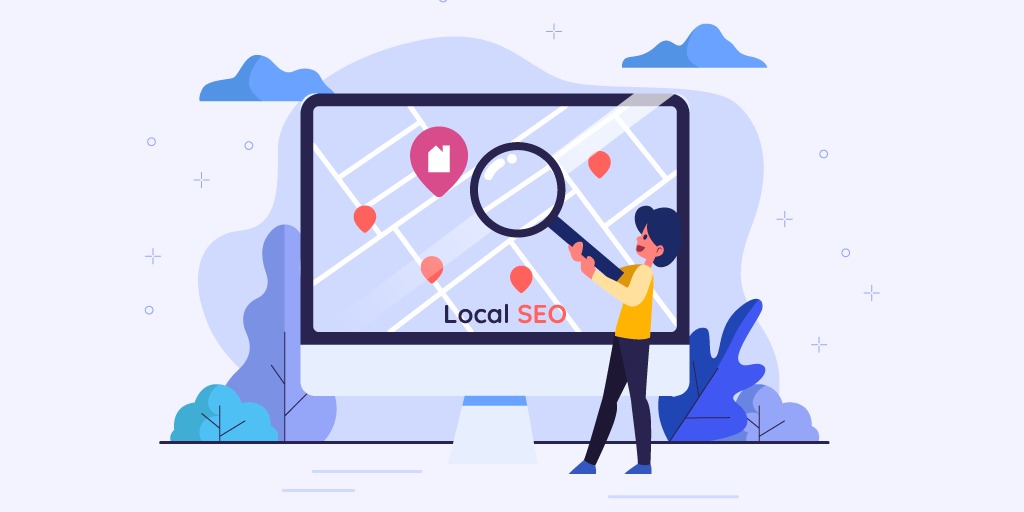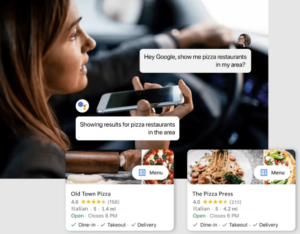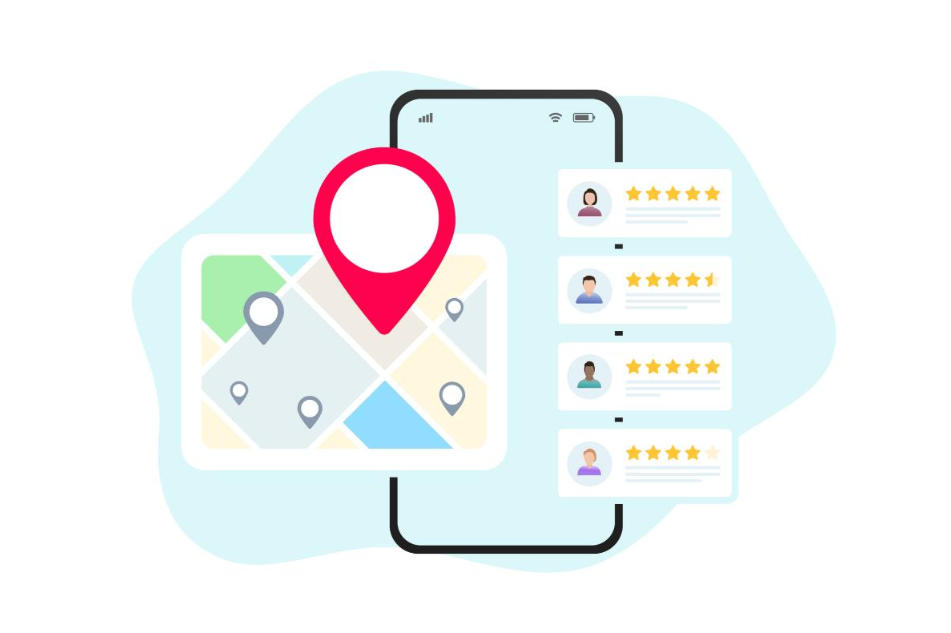Introduction
Digital marketing’s cornerstone is local search optimization, which connects businesses to nearby customers who are actively looking for them. With “near me” searches becoming more popular, local SEO has become increasingly important for businesses trying to dominate their local markets. Businesses can enhance visibility, drive foot traffic, and build long-term relationships with their communities.

Learn how to implement strategies to ensure your business thrives in the local digital landscape with this comprehensive guide.
SEO for local businesses
Local SEO: Definition & Importance
Search engine optimization for local searches is how you get more business. The keywords in these searches are usually location-based like “near me” or include the name of the city.

How to Optimize for Local Searches
Local SEO vs. General SEO
While general SEO focuses on global or national visibility, local SEO focuses on proximity and relevancy within specific regions. When it comes to ranking for “best pizza in Chicago,” strategies are different than when it comes to ranking for “best pizza recipes.”
Local searches are good for these industries
Local searches are especially important for industries like hospitality, healthcare, retail, and home services. Dentists, for example, gain more from “dentist near me” searches than from broader SEO. Local SEO also helps businesses increase their visibility on Google Maps and other search engines. Additionally, local SEO can help businesses target potential customers in a specific area.
Local SEO Components
Business Claim and Verification
The cornerstone of local SEO is your GMB profile. Ensure that Google displays the right information about your business by claiming and verifying.
Making GMB profiles accurate and detailed

How to Optimize for Local Searches
The best GMB profiles include your address, phone number, operating hours, photos, and services. It’s easier for customers to trust and engage with your business if you give them more information.
How to handle reviews effectively
Establishing credibility requires reviews. Respond to reviews quickly, both positive and negative, while keeping a professional tone. Don’t be afraid to acknowledge compliments and address concerns constructively.
Keeping NAPs consistent
An address, a phone number, and a name

How to Optimize for Local Searches
The NAP stands for your business’s name, address, and phone number across all online platforms. This makes it easier for customers to contact you and for you to find you online. As a result, search engines can index your business and find you easier.
Consistent information across platforms is key
Discrepancies in NAP information can confuse search engines and customers, damaging your rankings. Customers can also get confused by inconsistencies between platforms, making it hard to find information. Building trust and ensuring accuracy requires consistent information across all platforms.
NAP Audit Tools
Make sure your listings are consistent across directories with tools like Moz Local and BrightLocal. You’ll be able to identify any discrepancies and update your listings. Maintaining accuracy across all directories is crucial to making sure your brand is seen.
Citations from the locals

How to Optimize for Local Searches
Why Local Citations Are Important
The local citations are where your business is mentioned on websites, including your NAP. Boost your local search rankings and credibility. Local citations also help to build trust with customers. They show that your business is reliable and credible. They can also drive more traffic to your website.
The best platforms for local business citations
A few key platforms include Yelp, Yellow Pages, and TripAdvisor. Make sure these sites have accurate and consistent listings. Claim your business listings and make sure to update them regularly. Monitor customer reviews and respond to them quickly. Encourage customers to leave reviews.
Citation Building Strategies
Make sure your listings are on reputable platforms, monitor their accuracy, and update them as soon as something changes. Include a link to your website or social media profile. Set up alerts to be notified when your listings are mentioned. Monitor your citations regularly to make sure they’re still accurate.
Local SEO on-page
Local keyword title tags and meta descriptions
To align with local search queries, include location-specific keywords in your title tags and meta descriptions. Getting your pages ranked higher in local search results will help you attract more local traffic. Also, use keywords sparingly, as overuse is bad.
Landing pages that are specific to locations
Set up a page for each location if you have more than one. Make these pages localized with unique content. Give directions to your location, local contact info, and opening hours. Make sure your website has photos and videos so customers can see what you’re all about.
Structured Data Markup (Schema.org) for local SEO
Provide search engines with detailed information about your business with schema markup. You’ll get more relevant results for local searches when search engines understand your business. Boosting your visibility on local maps and other local listings can also help.
Creating localized content
Creating localized content
Consider creating blog posts, guides, or FAQs that are relevant to local customers. Roofing materials for New England winters, for example, might be written by a home improvement store.

How to Optimize for Local Searches
The best hyper-local blogs and resources
Topics like “Top 10 Restaurants in Brooklyn” and “Upcoming Events in Denver” resonate with local audiences. Local blogs and resources also provide valuable insight into local culture and customs. They are a great way for businesses to connect with potential customers and build relationships with the local community.
Community-specific events and news
Promote community activities, partner with local events, and sponsor them. Provide updates on the happenings in your community. Create content that highlights local initiatives. Encourage community participation.
Optimization for mobile

How to Optimize for Local Searches
Mobile searches and local SEO
More than 60% of local searches are done on mobile devices. Mobile optimization is key to meeting customer expectations. Mobile SEO strategies should be tailored for local searches. You need to make your website mobile-friendly, use local keywords, and create a local presence.
Optimizing your website for speed and mobile
Analyze your website’s speed with tools like Google PageSpeed Insights. Make sure your site is responsive on all devices. You should test your website on different devices and browsers. Keep an eye on your website’s performance and fix any problems as soon as possible.
Using Google Maps
You can make it easier for users to find your business by integrating Google Maps into your website. Your business can be found quickly and easily this way. Furthermore, it can provide directions and maps to help users find you.
Strategies for local SEO
Partnering with local businesses and organizations

How to Optimize for Local Searches
Create backlinks and referrals by collaborating with complementary businesses. Partnering with local venues would be great for a wedding photographer, for instance. Give partner businesses discounts and deals. Get your message out to more people by leveraging each other’s networks. We’ll go to local events together.
Using local PR to get links
Press releases about your business’ milestones or events should be sent to local news outlets. Building relationships with local media can help you build brand awareness. Additionally, the press release might link to your website, which is a good way to get backlinks.
Engaging with Local Social Media
Strategies for Local-Focused Social Media Campaigns

How to Optimize for Local Searches
Use location tags and hashtags to target local audiences. Share user-generated content and engage with community groups. Monitor and respond to comments and messages. Leverage local influencers and brand ambassadors. localize your content to ensure it’s relevent.
Engaging with Local Influencers and Communities
Collaborate with local influencers to amplify your reach and build trust within the community. Identify influencers who share the same values and interests as your brand. Reach out to them and form partnerships. Leverage the power of their networks to spread the word about your brand.
SEO with reviews
Promoting positive customer reviews

How to Optimize for Local Searches
Let your customers leave reviews on GMB, Yelp, and industry-specific platforms. Get customer feedback in person and online. Monitor reviews and respond to negative ones right away. Thank customers for their good reviews. Keep an eye on customer feedback and adjust your services as needed. Reward your referrals. Improve your services based on customer feedback.
Improve your rankings and trust with reviews
Take customer feedback and use it to improve your service. Customer complaints should be handled professionally and promptly. Don’t forget to let your customers know what you think. Regularly monitor customer feedback. Identify trends in customer sentiment by analyzing customer feedback. Don’t be afraid to take action when you need to. Thank you for the feedback.
Analyzing local SEO results
Metrics for tracking local SEO
Keep track of local keyword rankings, traffic, and conversions with tools like SEMrush and Google Analytics. Keep an eye on local organic search with tools like Google Search Console.

How to Optimize for Local Searches
Keep an eye on local reviews and respond to customer feedback. Keep an eye on your local competitors. Keep an eye on local SEO trends. Make sure you’re optimized for local searches. Keep an eye on your local SEO.
Track traffic, rankings, and conversions
Track metrics like organic traffic, map pack rankings, and landing page conversions. Identify areas for improvement based on the data. Ensure successful results by making adjustments. Make sure the changes are working. Keep an eye on the results. Adapt your strategy as needed. Make sure you’re always improving.
SEO challenges for local businesses
Pitfalls businesses face with local SEO

How to Optimize for Local Searches
Unclaimed GMB profiles, outdated NAP information, and duplicate listings are often obstacles to success. Your business may be hard to find, and search engines may have trouble indexing it correctly. Regularly review your Local SEO strategy to make sure it’s working.
Getting rid of duplicate listings
Identify and fix duplicate or incorrect listings with citation management tools. Make sure you update your business info regularly. Make sure your listings are accurate by monitoring them regularly. Reply to customer reviews.
Google’s Local Search Algorithm Updates

How to Optimize for Local Searches
Keep an eye on things like Google’s Possum and local ranking factors. Make sure your content is local and relevant, and make sure you are optimized for local searches. Use local keywords and local citations. Keep an eye on local search results and adjust your strategy as needed.
Here are some case studies
Local SEO examples from the real world
Within three months, a small bakery got 50% more foot traffic after optimizing its Google My Business profile. Within a week of optimizing their Google My Business profile, an electrician business had 25% more calls. Within a month of optimizing its GMB profile, a restaurant saw a 20% increase in online orders.
Takeaways from the experience
Local SEO success depends on consistent NAP details and social media engagement with local customers. Regularly check your NAP details to make sure they’re accurate. As well as creating and maintaining a presence on relevant social media platforms, companies should engage regularly with their followers.
Local SEO’s future

How to Optimize for Local Searches
New Trends: Voice Search and “Near Me”
Voice searches like “Find a coffee shop near me” are on the rise. Take advantage of conversational keywords.
Local search and AI
How search engines deliver local results is changing thanks to artificial intelligence tools like Google’s RankBrain. AI tools are becoming increasingly adept at understanding user intent and delivering better results. This is leading to better local search results, with more accurate and relevant results being delivered to searchers.
Local SEO Preparation
Keep up with local SEO by adopting new technologies. Monitor local SEO performance regularly. Analyze local SEO data to identify trends and opportunities. Implement local SEO strategies to ensure long-term success.
Conclusion
Businesses who want to reach local customers and outpace their competition need local SEO. Local search visibility can be significantly enhanced by optimizing GMB profiles, making sure NAPs are consistent, creating localized content, and leveraging mobile-first strategies. Additionally, businesses should also focus on local link building, local keyword research, and local link building. Finally, local businesses should track their local SEO efforts to measure their success.


